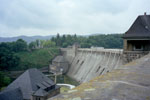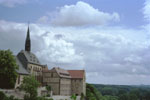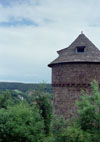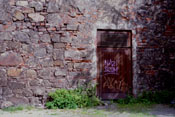I was going to go into Marburg this morning and see the castle and the Dom. But I have a lot of ground (as always) that I want to cover today, and it's raining now. Not the most pleasant weather for walking around. Plus, the places I want to go to don't open for another hour or two.
But I am happy that I've stayed on for breakfast. Here in this little village the church bells are ringing, cows moo and groan. There are some deer in the field between the hotel and the train tracks...
Perhaps I did have time to go into Marburg, but I didn't. I have six days now to get to Leipzig and my flights back to Washington. That's a lot of time, but I am afraid of not having the time I want to see things later on the trip if I see too many things now.
In Padderborn now at the end of the day. After leaving the gasthof outside Marburg, I went north to a place where the Eder river is dammed to form a huge artificial lake. High on a hill in Waldeck, overlooking the lake with a commanding view, is another castle. It's a very beautiful area. I spend most of the afternoon driving around the lake and doing a little bit of hiking. Grandpa's division passed just to the east of here, holding the road between Frankenberg and Padderborn, completing the encirclement of the Ruhr trapping 350,000 Nazi troops in the movement.
The Eder Dam was completed in 1914. I walk across it and wonder if grandpa may have come here during the war. And if he did, what would he have seen? In 1943 a special raid by the RAF (Operation Chastise) dropped a single 4 ton bomb on the Eder Dam and three others in the Ruhr. The blast exploded a hole 230 feet wide and 70 feet high. The lake rushed out to the valley below in a catastrophic flood.
I come north again to Padderborn. This industrial town was the last place the Germans had to escape the pincer movements of the 1st and 9th US armies. But there was to be no escape.
I take a little nap after checking in to the hotel. Refreshed and hungry, I take a walk around looking for a place to dine. The town is famous for it's springs, which well up at the foot of the Dom. They flow through the city in many small streams which come together to form the Pader river (hence Padderborn - source of the Pader).
I walk around the Dom, which seems to be an interesting complex of buildings and a small garden. I wind up at a small restaurant with a little garden in the back. In the shadow of the Dom I have a nice pork chop in a mushroom creme sauce. Very fresh mushrooms. Tomorrow I'll spend some more time at the Dom and the springs, then start moving east towards Berlin.
Monday 28 June 1999 I almost thought that I had missed a holiday today. More on that later. I started the morning getting some of this website done and on-line while I had access to a telephone. Then after checking out of the hotel I took a walk through Paderborn and over to the Dom. There are a couple of nice walks along the streams flowing up and through town.
At the Dom, the first thing I saw on a little history board outside were two pictures of the church from right after the war. Most of the Dom, in the photos, was destroyed. Only the basic outline of the structure remained. The importance of the town to Allied strategy must have been shown through the destruction that ensued.
Inside, the church is light and open. This may be due to the massive amounts of reconstruction done in the late seventies. This was apparently done with mostly concrete painted to look like stone. It did take me a while to pick up on it. But many of the ornaments and chapels survived the onslaught. The Dom is a "hall church" meaning that the two side aisles are the same height as the nave. Alongside both aisles, chapels have been added on to the Dom over the years.
Below the choir is the Crypt, which seems to have survived very well. I imagine the clergy huddled here to escape the bombardment, praying that the great church be saved. The relics of St. Liborius live here, and are taken out to the grand hall above every year at the Feast of St. Liborius.
Just to the north of the Dom, attached, is the cloister surrounding the Cemetery for the Chapter of the Cathedral. From here is visible the most famous aspect of this town. A stained glass window of three hares, designed so that each has two ears but together there are only three ears among them. Somehow I missed that, even though I was right there. Perhaps it was the two other things which caught my attention. One was a gravestone for a person who, from the date, died in the war here. The other, hidden by trees and off in a corner, a large rusting hunk of metal, twisted and blown open. A bomb, one that was dropped here. One this journey of discovery of the places grandpa was in during the war, how could I see anything else here. What importance do hares have compared to a life lost anonymously to an explosion dropping out of the sky?
After the Dom, I go looking for a bite to eat. But for some reason, everything seems to be closed. I still have a few biscuits in the car, and decide to finish them and get on the road. With some luck I'll find something to eat further down the road. My next stop is Warburg. I get there and find myself in a wrong turn taking me to something wonderful. Through streets that seem a bit to small and a bit too steep, I wind up and around into a neighborhood overlooking the old towers of the city. From the commanding view of the surrounding land, a lone cannon looks out here with the date 15 something on it. I find it coming to me that grandpa may not have been the first of my relatives to fight on this land of hills and streams.
I get turned back on the right track and head north towards Trendleberg. The small village is built around a hill, like so many small villages here. And in the center, like so many, is a small and simple castle. Perhaps built to be a garrison for the local duke, or perhaps his home, the one here seems to be a hotel now. But the door is closed and it's too early in the day for me to be setting in for the night. But I am getting an eerie feeling on the day how everything seems to be closed, and nobody seems to be around and about. I'm starting to think that it will be biscuits for dinner as well!
From Trendleberg I wind my way through the countryside to the Weser River. The road follows the river, riding above the flood plain but below the high hills that look down on the stream. Between the villages of Giesselwerder and Oberweser, I happen into my lunch. A little roadside cafe, it would have come and gone had I blinked my eyes too long. A wonderful terrace, looking out on the river is my dining room this afternoon. As I eat my sausage and fabulous potatoes, the fields below quiver in the wind like successive ripples on a pond. A boy chases his dog through another field on the other side of the river. Above him on the hillside, cows sit contentedly in the sunshine, the scent of their manure faint in the breezy air.
I would have taken a picture, but I am coming to believe that there are times and places where a picture just isn't the right thing to do. Moments so special that they cannot be comprehended or celebrated in a single image, or even in a series of them flashing quickly before your eyes on a screen. I have been feeling the same thing in all of the Doms and churches I have visited. Pictures of the outside, yes, showing how the places fit into the towns and the grand beauty that they have. But inside, well, maybe it's because it's a personal experience. That, and the light isn't great. But there are so many intricate details that come together to make these grand houses of worship. How can a photograph convey all of this to you. It cannot. You must go there to feel it for yourself. Lunch to day was like that.
And I was reminded of a line from a so-so science fiction movie, "Contact" with Jodie Foster. Playing a scientist, she is transported to the edge of the galaxy. Confronted with such sublime and overwhelming beauty, she exclaims "They should have sent a poet. It's so beautiful."
Well, having finally found something to eat, I move on down the Weser a ways further before turning east and into Gottigen (umlaut on the "O", gotta figure out how to make that happen on the page!). A large industrial town that feels like an American suburb, I pass through it hoping the next town is a little more charming. This isn't saying that Gottigen doesn't have its own special history. An old university town, it was a rather patrician place until Carl Frederich Gauss came on as director of the observatory and professor of astronomy. For those who don't recognize the name, it is now used as a measure of magnetic intensity. And for those in my business, do think about him as you de-Gauss your next videotape! Also here is buried Max Planck, perhaps even a greater practician of physical theory than Einstein. It was Planck, in 1900, who came up with the idea of Quantum Mechanics. Since the end of the war, the university has been the headquarters for the Max Planck Society, which groups together some 50 research organizations in Germany. Previously it was the Kaiser Willhelm Institute, the great engine of discovery during the 1800s.
After my brief foray through Gottigen, I come to Northeim. Another town of light industry and suburban feel. I bypass for the time being the town of Osterode, heading instead for Duderstadt. It's a little out of the way, and I think it will make for a good ending place for today. One my way I pass a few small guest houses and bars, and I see a sign for one that is apparently about 4k into the countryside. Sounds like the perfect thing if I don't find anything in Duderstadt. There is a hotel mentioned in the Michelin guide, and it's supposed to have a restaurant of enough reputation to get a little smiling Michelin Man face next to it. Well, I get to Duderstadt, and I think the hotel is somewhere down the pedestrian plaza at the center of this town. Well, I guess that's why there isn't a nice little car next to the chubby little face of the man with more folds than a shitzu!
So, back towards Northeim I go looking for that little sign pointing towards the home in the countryside. Well, I wind up making the trip three times and not seeing the sign again once. Maybe I was hallucinating. That would be a bit worrisome. So I give up and check into one of the other restaurant-hotels along the way. This one is by far the best I have been in so far. Two beds, a private toilet, and a telephone. Definitely a cut above the Mondial in Cologne!! And that's where we are now at the end of the day. The TV here only has programming in German. "The X-Files" is on, overdubbed in German. Scully actually has a throaty, sexy voice that's deeper than Mulder's. You can find your own meaning for that!
PS well, there's a phone, and I can get the line into the Powerbook, but I can't seem to figure out how to dial an outside line. And the instructions are in German and my phrase book isn't much help beyond understanding that I'm supposed to lift the handset!!! So, you'll just have to wait to read all the latest from the Hessian roads!






